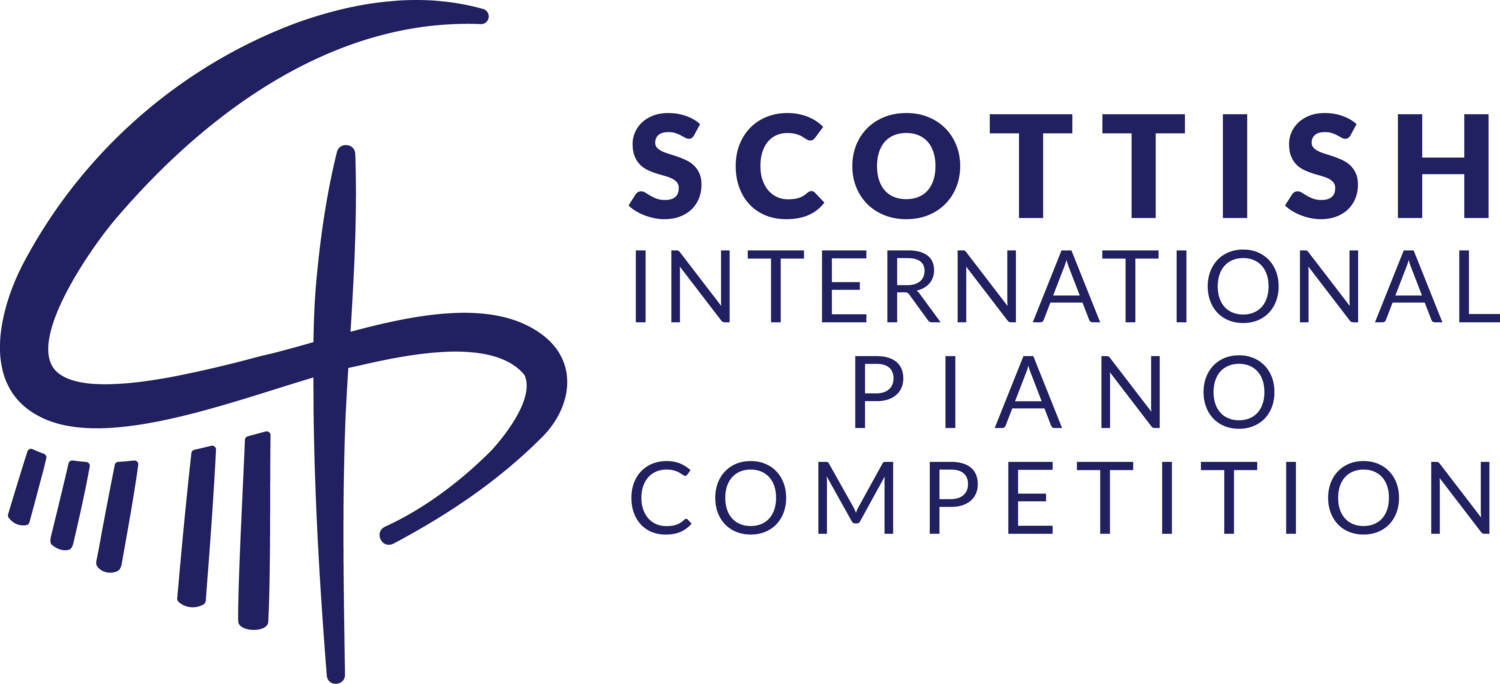
The Scottish International Piano Competition was established in 1986 as a memorial to Frederic Lamond.

The First Prize of the Competition traditionally carried with it the Frederic Lamond Medal.
Frederic Lamond
A contemporary of the great Charles Rennie Mackintosh, Lamond (1868 - 1948) was born in Bridgeton, Glasgow, and spent his early years at 91 Tullis Street. A memorial plaque commemorating his birth has now been placed on the façade of the building.
With the generous support of the City Fathers, Frederic Lamond was able to study in Germany. The young Scot was one of the very last pupils of Franz Liszt, and contemporary photographs taken during the last year of Liszt’s life show Lamond as one of the chosen few. The great composer pianist attended the young Lamond’s London recital, and Tchaikovsky was equally enthusiastic about his playing.
Frederic Lamond made his career in Germany, settled in Berlin, and was greatly admired for his interpretations of Beethoven and Brahms. Whilst his reputation was principally based in Europe, he also taught for a while at the Eastman School of Music in New York, USA.
Lamond was a pioneer of recorded performance. Most of his Beethoven piano sonata records were made for HMV during the 1920s in London. Lamond eventually returned to live in Scotland in 1935 and, under William Whittaker’s leadership, taught at the Scottish National Academy – the future Royal Conservatoire of Scotland.
Lamond died in Stirling in 1948.

The Second Prize of the Competition traditionally carried with it the Lawrence Glover Medal.
Lawrence Glover
Lawrence Glover was Head of Keyboard Studies at The Royal Scottish Academy of Music and Drama in 1986, when the SIPC was established. He encouraged the founding of the competition by two of his staff members, Elisabeth Jacobs and Bernard King, to widen the horizon of young pianists studying at The Academy. Lawrence studied with Gordon Green and Claudio Arrau, and performed with many of the leading British orchestras. He gave broadcasts on BBC Radio and Television, in addition to performances as a chamber musician with the Naxos and Alberni String Quartets.

A Piano Competition for Glasgow
Robin Barr relates how the Scottish International Piano Competition came into being:
None of the performances were truly world-class, but, in competition terms, the foundations had been laid for a useful and worthwhile triennial event
So ran The Daily Telegraph review after the first Scottish Piano Competition, held in Glasgow, in September 1986. Our executive committee, just six of us, chaired by Prof. Rupert Leslie, had the bright gleam of success in our eyes … mission accomplished!
Behind us lay a memorable week of pianoforte recitals given by 24 young pianists of Scottish descent from around the world in the old Stevenson Hall of The Royal Scottish Academy of Music and Drama in St George’s Place; and we had finished off with a full house in Glasgow City Hall for the televised final. Best of all, however, was the promise of no less than 40 engagements we had negotiated for our winners with Scotland’s concert-promoting organisations.
Initially, we had no thoughts of going fully international. Instead, the competition aimed to bring recognition and motivation for our own country’s aspiring pianists – advanced students at the RSAMD – who in those days found little or no opportunity for public performance in Scotland.
Previously, Glasgow City Council had run a musically successful but costly International Junior Violin Competition, so the appetite among sponsors for another music competition must have been patchy when Elisabeth Jacobs (official accompanist at the Glasgow Junior Violin Competition) and Bernard King, her fellow teacher at the RSAMD, suggested a new competition for pianists aged eighteen years and over. When Rupert and Elisabeth asked me to join this little keyboard conspiracy of volunteers to handle the administrative aspects of the event, and to find concert opportunities for the young contestants, I barely realised what would develop as we worked our way towards becoming a recognised world-class international event: The Scottish International Piano Competition.
RSAMD Governors Morrison Dunbar, Ainslie Millar, Walter Wolfe, and the Head of Keyboard Studies, Lawrence Glover, were generously supportive throughout, but we faced a series of difficulties in the real world of competition promotion. Would the aged Steinway in the Stevenson Hall be wrecked by umpteen performances of the Liszt Sonata or Ravel’s Gaspard by umpteen unknown, untried performers ? Since there was no PRS licence for charging entry to public concerts in the old RSAMD building, all performances had to be ticket-free … where then, was our ‘gate-money’ to come from ? Could a fair competition be held at all – with first and second stage recitals taking place in a concert venue (Stevenson Hall) right in the centre of Glasgow’s busy city traffic? Yes, an Edwardian concert hall with single glazed windows! And where would the 24 pianists practise, with only half-a-dozen suitable instruments in the Academy, and a jury of busy concert pianists, to be accommodated into the bargain?
In the event, Glasgow, ‘the friendly city’, provided the answer, when Aubrey Gerber set up the hospitality committee, which was soon to bring together 24 families with grand pianos who would invite the competitors into their homes for competition week.
The financial situation was somewhat perilous throughout 1985, with only a £200 funding advanced by The Royal Bank, but no other interested sponsor, and a budget of £17,500 required as the minimum cost for the event. Worse still, we had no professional controller of finance! It was not until four months before the Competition, in May 1986, that Leslie Reid was co-opted to become our excellent honorary treasurer, joining Jeanette Feny, our efficient competition secretary.
Then, out of the blue came our sponsorship – relief all around! (As The Scottish Piano Competition was not a Limited Company, the committee of six volunteers had been collectively responsible for any losses). In May 1986, with just four months until the event was due to take place, a cheque for £10,000 from IBM in Greenock came through the door. This moved other sponsors to commit in our favour, with The Glasgow Herald, Glasgow City Council, The Royal Bank, Scottish Television, and McCormacks Music all contributing four-figure sums.
By this time, we had already engaged our visiting jury – composer Robert Crawford (Chairman), Moscow Gold Medallist Viktor Friedman, RAM London Head of Keyboard Studies Alexander Kelly, Anthony Goldstone, and Nina Milkina, who remembered herself, as an aspiring young pianist, being encouraged by Rachmaninov, no less.
Over that summer, young pianists began to risk their careers by applying for this unknown event in Glasgow – a city which had once promoted recitals by Chopin, D’Albert, and Bartók, and had reared that young Bridgeton boy, protégé of Franz Liszt … Frederic Lamond. A recently composed Sonata by Martin Dalby was chosen as the Test Piece.
September came, and a dramatic final on Saturday 13th in the City Hall saw Bryden Thomson’s kindly baton directing the young players with the SNO through the turns and twists of concertos by Prokofiev, Mozart, and Schumann. The performance was seen on the following Sunday by the viewing public, throughout Central Scotland. The rest of the country had to wait for those future concerts we had lined up, from Thurso to Gatehouse of Fleet, which would be shared by all our semi-finalists (not just the winner) – as the original purpose of the competition was to promote all participants in their careers.
Many of those first entrants to the Scottish (International) Piano Competition lived up to the praise of critics and public that September 1986, enjoying a distinguished career in music, right up to the present time … Iain Burnside, Jessica Drake, Nigel Hutchison, Mary Ann Kennedy, Lucy Parham, and of course, the three Finalists: Christopher Oakden, Susan Tomes, and winner Graeme McNaught.
IBM management was delighted with the success of its sponsorship, while the Piano Competition treasurer, Leslie Reid, was also delighted to report a surplus of nearly £2,000 towards the future, or, as The Daily Telegraph might put it:
The foundations for a useful and worthwhile triennial event

